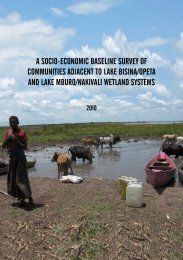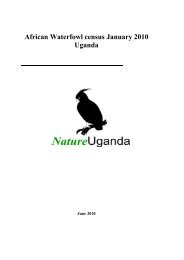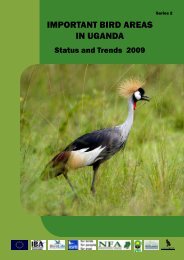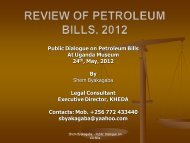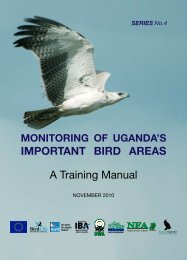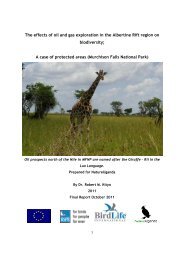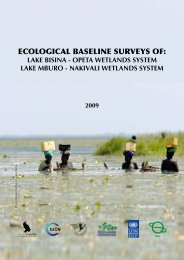the economic valuation of the proposed ... - Nature Uganda
the economic valuation of the proposed ... - Nature Uganda
the economic valuation of the proposed ... - Nature Uganda
You also want an ePaper? Increase the reach of your titles
YUMPU automatically turns print PDFs into web optimized ePapers that Google loves.
to mature. Subsequently, conservation is superior to<br />
agriculture; and converting 7,186 ha <strong>of</strong> Mabira CFR<br />
into agriculture would result into a net loss <strong>of</strong> US$ 15.2<br />
million to society. In fact, because sugarcane is a ratoon<br />
crop <strong>the</strong> value <strong>of</strong> <strong>the</strong> cane lasts only <strong>the</strong> five years <strong>of</strong> <strong>the</strong><br />
ratoon and a new crop is replanted. Therefore, <strong>the</strong> true<br />
value <strong>of</strong> a sugar crop is US$ 12.3 milion, which is US$<br />
32.8 milion inferior to <strong>the</strong> conservation option.<br />
• What if degazettement goes ahead?<br />
The National Forestry and Tree Planting Act has provisions<br />
for compensatory measures in case <strong>of</strong> degazettement<br />
– that is, fair and equal value. Also, <strong>Uganda</strong>’s social<br />
and environmental safeguard policies are clear on<br />
compensation. Hence, despite <strong>the</strong> evidence that <strong>the</strong><br />
conservation is a superior alternative to sugarcane<br />
growing, if o<strong>the</strong>r reasons compel <strong>the</strong> degazettement<br />
<strong>of</strong> <strong>the</strong> 7186 ha <strong>of</strong> Mabira CFR, <strong>the</strong>n <strong>the</strong> developer must<br />
compensate for <strong>the</strong> values lost from <strong>the</strong> conservation<br />
alternative. This total value is estimated at US$ 45.1<br />
million, payable to <strong>the</strong> NFA for conservation activities in<br />
general and Mabira in particular. However, before doing<br />
so, <strong>the</strong> land use change should in addition be subjected<br />
to <strong>the</strong> environmental impact assessment (EIA) process<br />
to satisfy legal, and social and environmental safeguard<br />
policies <strong>of</strong> GoU.<br />
The pertinent question for SCOUL is whe<strong>the</strong>r paying<br />
<strong>the</strong> US$ 45.1 million represents a cheaper alternative to<br />
buying or leasing private land. An expenditure <strong>of</strong> US$<br />
45.1 million would purchase 30,668 ha <strong>of</strong> land (at Ushs<br />
2,500,000 per hectare assuming an exchange rate <strong>of</strong><br />
1US$ = Ushs 1,700) compared to <strong>the</strong> 7,186 ha at Mabira<br />
CFR.<br />
• Can SCOUL or <strong>the</strong> sugar industry<br />
48<br />
meet <strong>the</strong> national requirements for<br />
sugar?<br />
An answer to <strong>the</strong> above question is a resounding ‘no’.<br />
The reason is that even if <strong>the</strong> four sugar companies<br />
can produce volumes <strong>of</strong> sugar equal to <strong>the</strong> national<br />
requirement, imports will still be necessary. At <strong>the</strong><br />
moment <strong>the</strong> factories are unable to produce all grades<br />
<strong>of</strong> sugar in sufficient quantities to meet <strong>the</strong> aggregate<br />
national demand. The firms, <strong>the</strong>refore, need to first invest<br />
in processing capacity for <strong>the</strong> different grades <strong>of</strong> sugar<br />
before consideration can be given to self-sufficiency in<br />
sugar production (assuming this is a socially desirable<br />
goal).<br />
• Is <strong>the</strong>re a national sugar industry<br />
strategy?<br />
What one may call <strong>the</strong> ‘Mabira saga’ has over-shadowed<br />
an important debate about <strong>the</strong> sugar industry. This is<br />
wrong. Mabira is an issue because a single firm SCOUL,<br />
and not <strong>the</strong> whole industry wants an access to some<br />
<strong>of</strong> <strong>the</strong> CFR land. There are important industry issues<br />
to be addressed. For example, is a strategy towards<br />
self-sufficiency in sugar production desirable? Is it<br />
efficient? Can <strong>Uganda</strong> produce all <strong>the</strong> grades <strong>of</strong> sugar<br />
required by both household and industrial consumers?<br />
If <strong>the</strong> GoU is fully satisfied that <strong>the</strong> country has a clear<br />
and demonstrable comparative advantage in sugar<br />
production, <strong>the</strong>n why not produce as much sugar as<br />
possible to satify both domestic and export demands?<br />
Where should <strong>the</strong> incremental sugar production come<br />
from? In o<strong>the</strong>r words, are <strong>the</strong>re o<strong>the</strong>r parts <strong>of</strong> <strong>the</strong><br />
country where sugar can be produced competitively?<br />
Can increased sugar production be used as one strategy<br />
to promote poverty reduction and satisfy <strong>the</strong> ‘wealth for<br />
all’ objective?<br />
Answering <strong>the</strong> foregoing questions will require an<br />
examination <strong>of</strong> <strong>the</strong> whole sugar industry and not just<br />
<strong>the</strong> tribulations <strong>of</strong> SCOUL alone. By devoting exclusive<br />
energy to <strong>the</strong> Mabira debate, an opportunity to examine<br />
<strong>the</strong> whole sugar industry is lost and it forces GoU to make<br />
some ra<strong>the</strong>r obscure ‘seat <strong>of</strong> <strong>the</strong> pants’ decisions. There is,<br />
<strong>the</strong>refore, a need to re-direct <strong>the</strong> Mabira debate to focus<br />
on <strong>the</strong> entire sugar industry and not just SCOUL alone<br />
so as to come up with more comprehensive solutions to<br />
<strong>the</strong> challenges facing, and <strong>the</strong> opportunities presented<br />
by, <strong>the</strong> sugar industry.<br />
The Economic Valuation <strong>of</strong> <strong>the</strong> Proposed Degazettement <strong>of</strong> Mabira CFR | 2011



